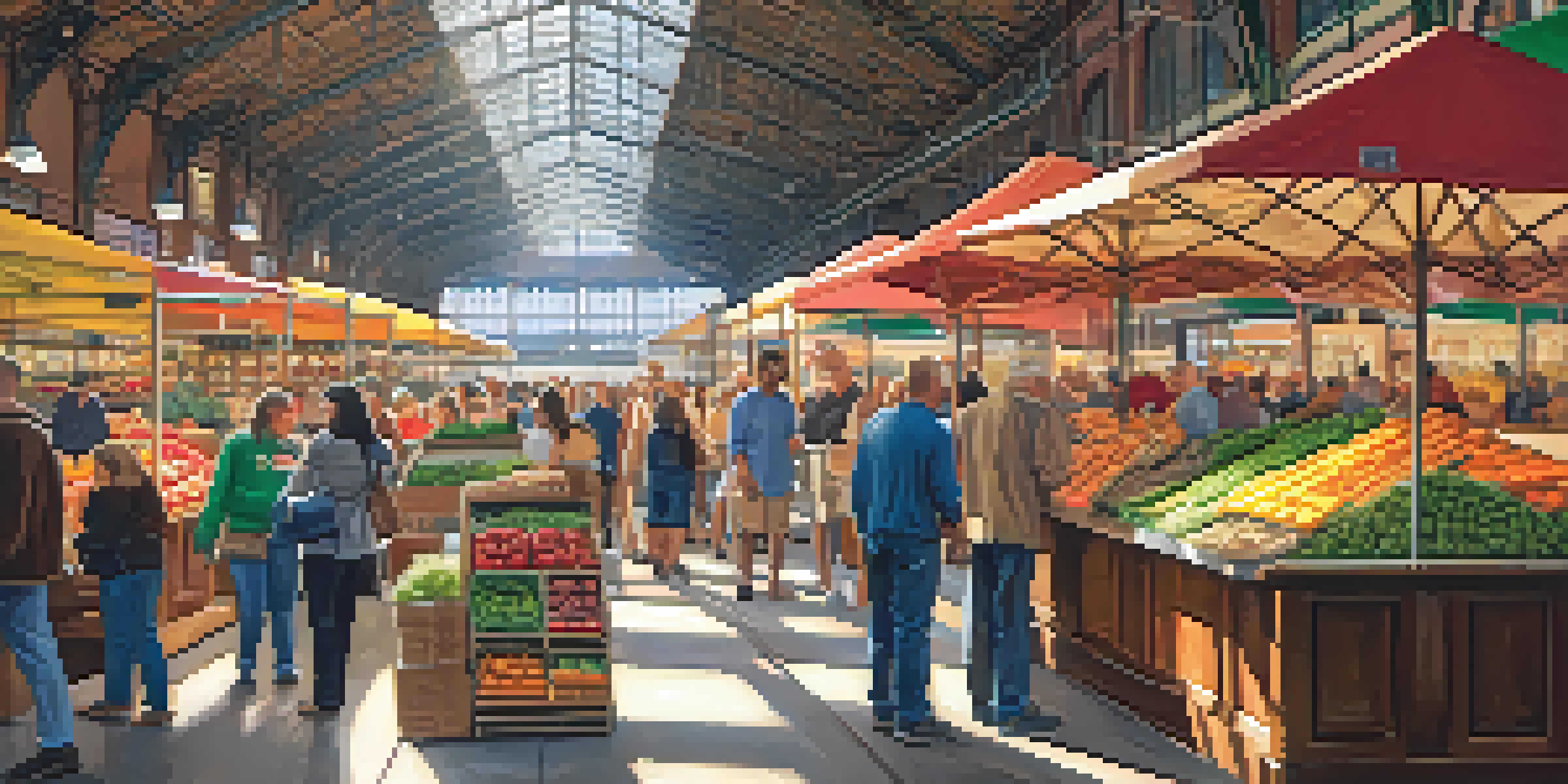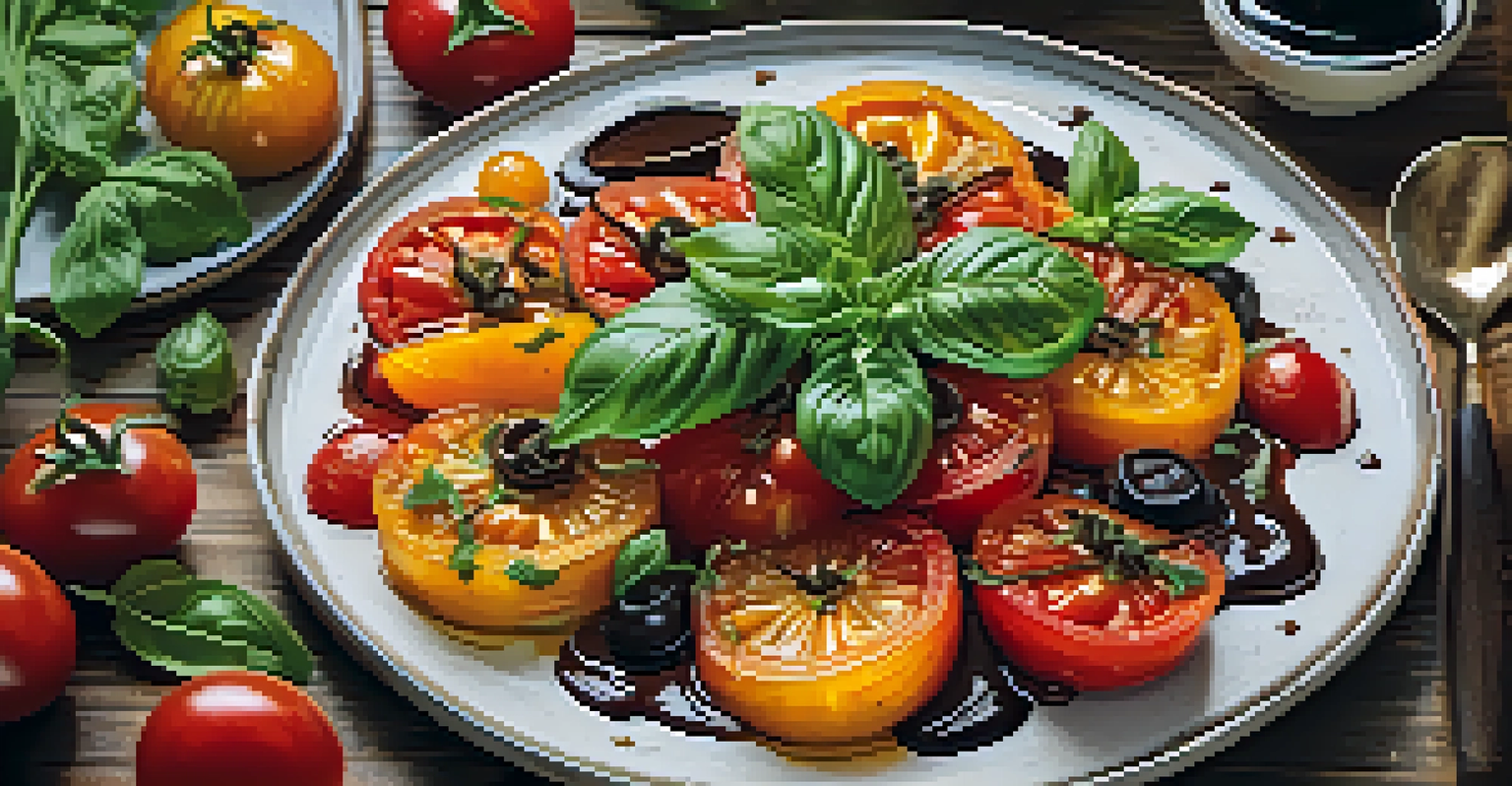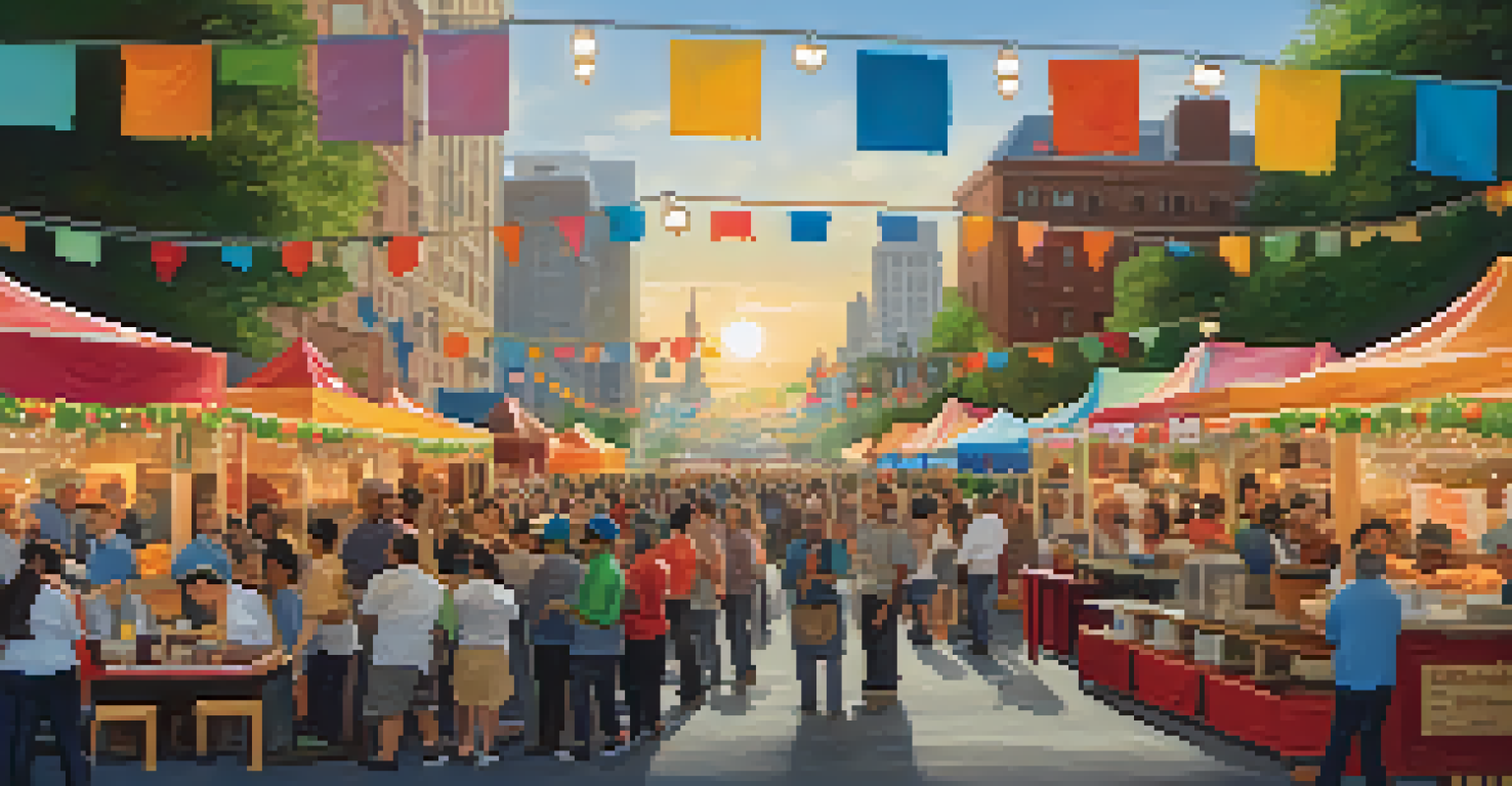Culinary Arts in Philadelphia: A Fusion of Culture and Flavor

The Rich Culinary History of Philadelphia
Philadelphia’s culinary arts are steeped in a rich history that dates back to the founding of the city. From the iconic cheesesteak to the diverse array of international cuisines, each dish tells a story of cultural influence and evolution. As a melting pot of immigrants, Philadelphia has embraced flavors from around the globe, creating a unique culinary landscape.
Food is our common ground, a universal experience.
Historical landmarks like the Reading Terminal Market capture this essence, showcasing local vendors who offer everything from fresh produce to artisanal cheeses. This market not only serves residents but also attracts visitors eager to taste the city's offerings. It’s a testament to how food can connect us to our history and heritage.
As you stroll through the city, the scent of roasted coffee, baked goods, and sizzling meats fills the air, inviting you to explore. Each neighborhood reflects its cultural roots through its food, making dining in Philadelphia an adventure that celebrates both the past and the present.
Exploring Diverse Culinary Influences
Philadelphia's culinary scene is a delightful tapestry woven from various cultural influences. Italian, Irish, Asian, and African American communities contribute their flavors, each adding a unique twist to traditional dishes. This blend creates an exciting array of culinary experiences that cater to every palate.

For example, you can find authentic dim sum in Chinatown, while South Philadelphia boasts some of the best Italian restaurants outside of Italy. Each bite reveals a layer of cultural significance, giving you more than just a meal—it's a taste of history. This fusion not only enhances the local dining experience but also fosters community and understanding among different cultures.
Culinary Diversity in Philadelphia
The city's rich culinary scene reflects various cultural influences, from Italian to Asian, creating a vibrant tapestry of flavors.
Food festivals, like the Philadelphia Folk Festival, celebrate these diverse influences, allowing chefs to showcase their culinary creations. Such events provide a platform for cultural exchange, highlighting how food can bring people together and celebrate differences in a delicious way.
The Rise of Innovative Culinary Techniques
In recent years, Philadelphia has become a hub for culinary innovation, where chefs push boundaries and experiment with new techniques. The farm-to-table movement has gained traction, emphasizing fresh, local ingredients that enhance flavors and sustainability. This shift not only supports local farmers but also gives diners a taste of the region's best offerings.
Cooking is like love. It should be entered into with abandon or not at all.
Chefs are now incorporating molecular gastronomy, a trendy technique that uses science to create surprising textures and presentations. For instance, you might find a dish that features edible spheres bursting with flavor, transforming your dining experience into a sensory adventure. Such creativity keeps the culinary scene vibrant and engaging for both locals and visitors.
Moreover, the rise of food trucks and pop-up restaurants has democratized fine dining, making innovative cuisine accessible to all. This means you can enjoy gourmet dishes in casual settings, breaking down barriers between the chef and the diner, and making every meal an exciting experience.
Local Ingredients: A Focus on Freshness
One of the hallmarks of Philadelphia's culinary arts is the emphasis on local ingredients. Farmers' markets and community-supported agriculture programs play a vital role in connecting chefs with fresh produce, meats, and dairy. By sourcing ingredients locally, restaurants can create dishes that are not only delicious but also sustainable.
Seasonal menus are a popular trend in the city, allowing chefs to showcase the best of what each season has to offer. Imagine enjoying a dish of roasted heirloom tomatoes in the summer or a cozy pumpkin soup in the fall. This approach not only highlights the region's bounty but also keeps the dining experience fresh and exciting.
Focus on Local Ingredients
Philadelphia's emphasis on sourcing local ingredients fosters sustainability and enhances the dining experience with seasonal menus.
Supporting local farms also fosters a sense of community and responsibility, as diners become more aware of where their food comes from. It encourages a deeper appreciation for the flavors of the region and the hard work that goes into producing them, creating a more meaningful dining experience.
Food as a Cultural Connector
In Philadelphia, food serves as a powerful connector of cultures and communities. Restaurants often host events that celebrate cultural heritage, such as themed dinners or cooking classes. These gatherings create opportunities for people to come together, share stories, and learn about different culinary traditions.
For instance, a Filipino restaurant might host a lechon (roasted pig) feast, inviting diners to experience a traditional celebration. Such events not only showcase unique dishes but also offer insights into the cultural significance behind them. It’s a beautiful reminder of how food can transcend boundaries and foster understanding.
Additionally, community initiatives like food tours allow locals and tourists alike to explore the city's diverse culinary landscape. These tours highlight the stories behind various cuisines, enriching the overall experience and encouraging a deeper connection to the city’s vibrant culture.
The Impact of Culinary Schools and Training
Philadelphia is home to several esteemed culinary schools, such as the Restaurant School at Walnut Hill College, which plays a significant role in cultivating talent. These institutions focus on teaching aspiring chefs not only the art of cooking but also the business side of the culinary industry. This comprehensive training ensures that graduates are well-prepared to make their mark in a competitive field.
Students learn from experienced chefs and gain hands-on experience in real-world kitchens, fostering creativity and innovation. This training encourages them to explore new flavors and techniques, ensuring that the culinary scene continues to evolve. The passion and skill of these graduates contribute to Philadelphia's reputation as a culinary destination.
Future Trends in Culinary Arts
Emerging trends like plant-based dining and ethical sourcing are shaping a responsible and innovative culinary landscape in Philadelphia.
Moreover, collaborations between chefs and culinary schools often result in unique dining experiences for the community. Pop-up dinners featuring student chefs provide a platform for creativity while allowing guests to enjoy innovative dishes crafted by the next generation of culinary talent.
The Future of Philadelphia's Culinary Scene
As we look to the future, Philadelphia's culinary arts are poised for exciting developments. With an ever-growing focus on sustainability and ethical sourcing, chefs are increasingly committed to making choices that benefit the environment and their communities. This shift is crucial in shaping a responsible culinary landscape that future generations can appreciate.
Emerging trends, such as plant-based dining and global fusion cuisine, are also gaining popularity, reflecting changing consumer preferences. Restaurants are experimenting with innovative ways to incorporate more plant-based options, making it easier for everyone to enjoy delicious meals while being mindful of health and sustainability.

Ultimately, Philadelphia's culinary scene will continue to thrive as chefs, food enthusiasts, and the community come together to celebrate their shared love for food. It’s an exciting time for both locals and visitors, as the city remains a dynamic hub of flavor, culture, and creativity.